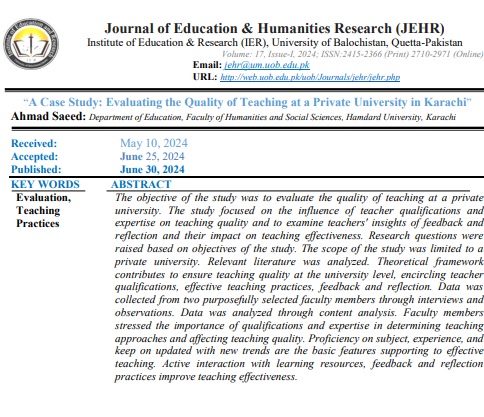A Case Study: Evaluating the Quality of Teaching at a Private University in Karachi
Abstract
The objective of the study was to evaluate the quality of teaching at a private university. The study focused on the influence of teacher qualifications and expertise on teaching quality and to examine teachers' insights of feedback and reflection and their impact on teaching effectiveness. Research questions were raised based on objectives of the study. The scope of the study was limited to a private university. Relevant literature was analyzed. Theoretical framework contributes to ensure teaching quality at the university level, encircling teacher qualifications, effective teaching practices, feedback and reflection. Data was collected from two purposefully selected faculty members through interviews and observations. Data was analyzed through content analysis. Faculty members stressed the importance of qualifications and expertise in determining teaching approaches and affecting teaching quality. Proficiency on subject, experience, and keep on updated with new trends are the basic features supporting to effective teaching. Active interaction with learning resources, feedback and reflection practices improve teaching effectiveness.
References
Barkley, E. F. (2010). Student engagement techniques: A handbook for college faculty. John
Wiley & Sons.
Clarke, A., Triggs, V., & Nielsen, W. (2014). Cooperating teacher participation in
teacher education: A review of the literature. Review of Educational Research, 84, 163–
https://doi.org/10.3102/0034654313499618
Council for the Accreditation of Educator Preparation. (2013). CAEP accreditation
standards. http://caepnet.org/standards/introduction
Darling-Hammond, L. (2000). Teacher quality and student achievement: A review of state policy
evidence. Educational Policy Analysis Archives, 8(1), 1-44.
Disha, M. (2016, November 3). Evaluation in teaching and learning process | education.
Your Article Library. Retrieved May 10, 2022,
from https://www.yourarticlelibrary.com/statistics-2/evaluation-in-teaching-and- learning- process-education/92476
Hattie, J., & Timperley, H. (2007). The power of feedback. Review of Educational Research,
(1), 81-112.
Jogezai, N. (2023, June 20). Education and EQ, Opinion, Dawn, Karachi Edition, p. 7.
https //www.dawn.com newspaper
Jones, A., & Smith, B. (2018). Enhancing Education Through Evaluation. Academic Press.
Mahmood, D. Z. (2017). Comparison of Internal and External Monitoring Systems in
Term of Students’ Attendance, Enrollment and Retention in Punjab Education
Department- Pakistan. Journal of Applied Environmental and Biological Sciences,
(8), 58-67.
Mehmood, F. (2024, January 19). Dishonest Academics, Letters to Editor, Dawn, Karachi
Edition, p. 7. https //www.dawn.com newspaper
Robinson, C. (2019). Evaluation in Educational Policy: A Comprehensive Analysis. Oxford
University Press.
Sandholtz, J. H., & Shea, L. M. (2012). Predicting performance: A comparison of
university supervisor predictions and teacher candidates’ scores on a teaching
performance assessment. Journal of Teacher Education, 63, 39-50.
https://doi.org/10.1177/0022487111421175–
Smith, J. (2023). Enhancing Educational Quality Through Evaluation*. Academic Press.
Stufflebeam, D. L. (March 17, 2007). CIPP Evaluation Model Checklist, Second Edition,
A Tool for Applying the CIPP Model to Assess Long-term Enterprises Intended for
Use by Evaluators and Evaluation Clients/Stakeholders.




